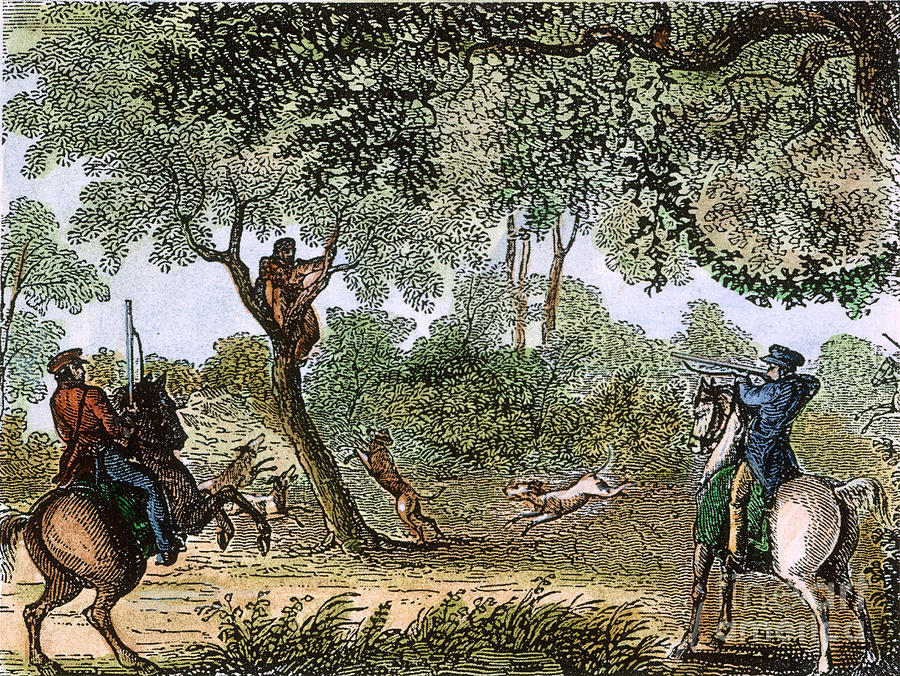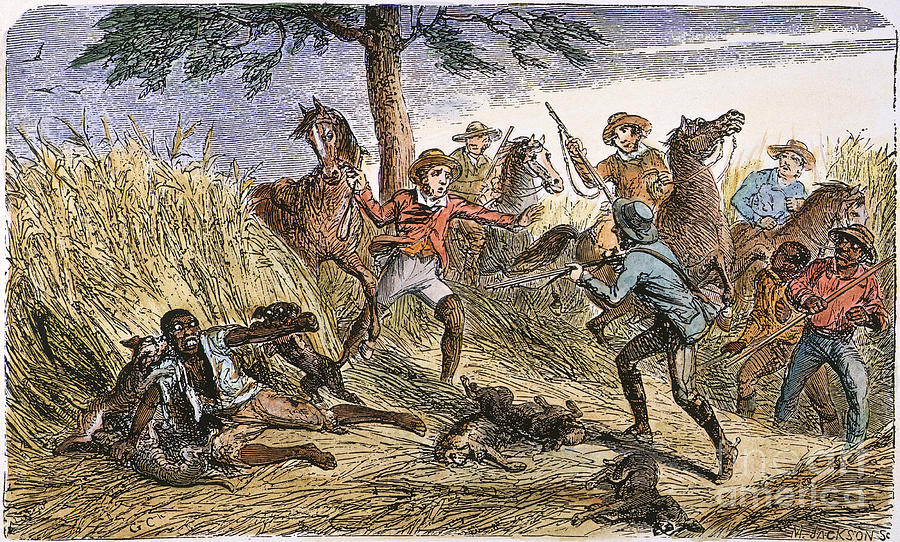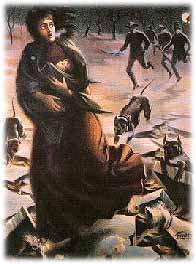
From the New York Times, "FROM WASHINGTON.; Charles Sumner on the Barbarism of Slavery. The Social Tendencies of the Institution Argued. Bitter Reply of a South Carolina Senator. The House on Post-office Business and Public Printing. FROM WASHINGTON, Published: June 5, 1860."
If this picture of the relations of slave-masters with their slaves could receive any further darkness, it would be by introducing the figures of the congenial agents through which the barbarism is maintained; the slave overseer, the slave breeder, and slave hunter, each without a peer except in his brother, and the whole constituting the triumvirate of Slavery, in whom its essential brutality, vulgarity, and grossness, are all embodied. There is the slave overseer, with, his bloody lash, fitly described in his Life of Patrick Henry by Mr. WIRT, who born in Virginia, knew the class, as "last and lowest, most abject, degraded, unprincipled," and his hands wield at will the irresponsible power. There is the slave breeder, who assumes a higher character, and even enters legislative halls, where, in unconscious insensibility, he shocks civilization by denying, like Mr. GHOLSON, of Virginia, any alleged distinction between the "female slave" and "the brood mare," by openly asserting the necessary respite from work during the gestation of the female slave as the ground of property in her offspring, and by proclaiming that in this "vigintial" crop of human flesh consists much of the wealth of his State, while another Virginian, not yet hardened to this debasing trade, whose annual sacrifice reaches 25,000 human souls, confesses the indignation and shame with which he beholds his State "converted into one grand menagerie, where men are reared for the market like oxen for the shambles," and lastly there is the slave-hunter, with the blood-hound as his brutal symbol, who pursues slaves as the hunter pursues game, and does not hesitate in the public prints to advertise his barbarism thus:
BLOOD-HOUNDS. -- I have two of the finest dogs for catching negroes in the Southwest. They can take the trail twelve hours alter the negro has passed and catch him with case. I live four miles southwest of Bolivar, on the road leading from Bolivar to Whitesville. I am ready at all times to catch runaway negroes. DAVID TURNER. -- MARCH 2, 1853. -- West Tennessee Democrat.
The bloodhound was known in early Scottish history. It was once vindictively put upon the trail of ROBERT BRUCE; and in barbarous days, by a cruel license of war, it was directed against the marauders of the Scottish border; but more than a century has passed since the last survivor of the race, kept as a curiosity was fed on meal in Ettrick Forest. (SCOTT's Lay of the Last Minstrel -- Notes, Canto V.) The bloodhound was employed by Spain against the natives of this continent, and the eloquence of CHATHAM never touched a truer chord than when, gathering force from the condemnation of this brutality, he poured his thunder upon the kindred brutality of the scalping-knife, adopted as an instrument of war by a nation professing civilization. Tardily introduced int, our Republic, some time after the Missouri Compromise, when Slavery became a political passion, and slave masters began to throw aside all disguise, the blood-hound has become the representative of our barbarism in one of the worst forms, when engaged in the pursuit of a fellow man who is asserting his inborn title to himself; and this brute is, indeed, typical of the whole brutal leash of slave-hunters, who, whether at home on slave soil, under the name of slave-catchers and kidnappers, or at a distance, under politer names, insult human nature by the enforcement of this barbarism.

3. From this dreary picture of slave masters, with their slaves and their triumvirate of vulgar instruments, I pass to another more dreary still, and more completely exposing the influence of Slavery; I mean the relations of slave masters with each other, also with society and Government, or in other words, the character of slave masters, as displayed in the general relations of life. And here I need your indulgence. Not in triumph or in taunt do I approach this branch of the subject. Yielding only to the irresistible exigency of the discussion, and in direct response to the assumptions on this floor, especially by the Senator from Virginia (Mr. MASON.) I shall proceed. If I touch slavery to the quick, and enable slave masters to see themselves as others see them, I shall do nothing beyond the strictest line of duty in this debate. One of the choicest passages of the master Italian poet DANTE is where a scene of transcendent virtue is described as sculptured in "visible speech" on the long gallery which led to the heavenly gate. The poet felt the inspiration of the scene, and placed it on the wayside, where it could charm and encourage. This was natural. Nobody can look upon virtue and justice, if it be only in images and pictures, without feeling a kindred sentiment.
Nobody can be surrounded by vice and wrong, by violence and brutality, if it be only in images and pictures, without coming under their degrading influence. Nobody can live with the one without advantage; nobody can live with the other without loss. Who could pass his life in the secret chamber where are gathered the impure relics of Pom[???] without becoming indifferent to loathsome things? But if these loathsome thing are not merely sculptured and painted if they exist in living reality -- if they enact their hideous capers in life, as in the criminal pretensions of Slavery -- while the lash plays and the blood spirts -- while women are whipped and children are sold -- while marriage is polluted and annulled -- while the parental tie is rudely torn -- while honest gains are filched or robbed -- while the soul itself is shut down in all the darkness of ignorance, and while the God himself is defied in the pretension that man can have property in his fellow man; if all these thing are present, not merely in images and pictures but in reality, their influence on character must be incalculable. It is according to irresistible law that men are fashioned by what is about them, whether climate, scenery, life or institutions. Like produces like, and this ancient proverb is verified always.

Look at the miner, delving low down in darkness, and the mountaineer, ranging on airy heights, and you will see a contrast in character, and even in personal form. The difference between a coward and a hero may be traced in the atmosphere which each has breathed; and how much more in the institutions under which each has been reared. If institutions generous and just ripen souls also generous and just, then other institutions must exhibit their influence also. Violence, brutality; injustice barbarism, must be reproduced in the lives of all who live within their fatal sphere. The meat that is eaten by man enters into and becomes a part of his body; the madder which is eaten by a dog changes his bones to red; and the Slavery on which men live, in all its five fold foulness, must become a part of themselves, discoloring their very souls, blotting their characters, and breaking forth in moral leprosy. This language is strong; but the evidence is even stronger. Some there may be of happy natures -- like honorable Senators -- who can thus feel and not be harmed. MITHRIDATES fed on poison and lived; and it may be that there is a moral Mithridates, who can swallow without bane the poison of Slavery. Instead of "ennobling" the master, nothing can be clearer than that the slave drags his master down; and this process begins in childhood and is continued through life. Living much in association with his slave, the master finds nothing to remind him of his own deficiencies, to prompt his ambition or excite his shame. Without these provocations to virtue, and without an elevated example, he naturally shares the barbarism of the society which he keeps. Thus, the very inferiority which the slave-master attributes to the African race explains the melancholy condition of the communities in which his degradation is declared by law. (source: The New York Times)




Great post. I was checking constantly this weblog and
ReplyDeleteI'm impressed! Very useful information particularly the remaining phase :) I care for such information much. I was looking for this certain info for a very long time. Thanks and good luck.
My web-site; bmi index chart
Article writing is also a excitement, if you be familiar with afterward you can write or else it is complicated to write.
ReplyDeletemy webpage :: solavei
It's an awesome paragraph in favor of all the internet visitors; they will get advantage from it I am sure.
ReplyDeleteHere is my web-site - http://www.teamboner.co.kr/xe/3239
This is really great for those of us who are trying to
ReplyDeletebalance family life, work, and school. This kind of certification is beneficial
for nurses and doctors working in pediatrics andd
paramedics health care sectors. Every training requirement and demand gets acdomplished in just few
hours beginning from 8 hour to 30 hour course duration.
My weblog ... read here - -
Do you have a spam issue on this website; I also am a blogger, and I was wondering your situation; many of us have
ReplyDeletedeveloped some nice procedures and we are looking to swap techniques with others, please
shoot me an email if interested.
Feel free to surf to my webpage - learn the facts here now
شركة تنظيف واجهات زجاج بالرياض
ReplyDeleteشركة نقل اثاث بالرياض
شركة شراء اثاث مستعمل بالرياض
شركة شراء اثاث مستعمل الرياض
hermes
ReplyDeletesupreme new york
yeezy boost
nike sneakers for men
supreme clothing
louboutin
adidas stan smith shoes
goyard handbags
jordan sneakers
hogan outlet online